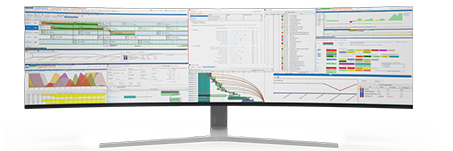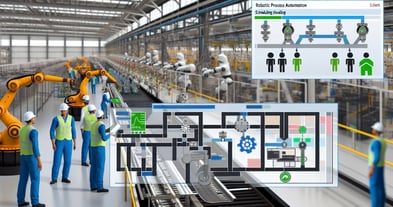Robotic Process Automation in Scheduling Workflows
In industrial manufacturing, staying ahead of the competition requires embracing cutting-edge technologies. One such technological leap that has significantly transformed manufacturing IT is Robotic Process Automation (RPA).
This blog looks into the integration of RPA in scheduling workflows, with a particular focus on the seamless collaboration between PlanetTogether, a leading production planning and scheduling tool, and major Enterprise Resource Planning (ERP), Supply Chain Management (SCM), and Manufacturing Execution Systems (MES) providers such as SAP, Oracle, Microsoft, Kinaxis, and Aveva.
Industrial Manufacturing Landscape
Industrial manufacturing is no longer confined to traditional methods. Today, manufacturers deal with intricate supply chains, complex production processes, and the constant pressure to optimize efficiency. The integration of RPA in scheduling workflows has emerged as a game-changer, providing a dynamic solution to these challenges.

The Rise of Robotic Process Automation in Manufacturing
Robotic Process Automation involves the use of intelligent software robots to automate routine tasks, making processes more efficient and error-free. In manufacturing, where precision and speed are paramount, RPA is a catalyst for transformation. By automating repetitive and rule-based tasks, RPA allows human resources to focus on strategic, creative, and value-driven activities.
The Crucial Role of Scheduling in Manufacturing
Efficient scheduling is the backbone of any manufacturing operation. It ensures optimal resource utilization, minimizes downtime, and maximizes output. However, traditional scheduling methods often fall short in adapting to the complexities of modern manufacturing environments.


PlanetTogether: A Pioneer in Production Planning and Scheduling
PlanetTogether has emerged as a leader in the field of production planning and scheduling. Its robust capabilities enable manufacturers to create detailed schedules, optimize resource allocation, and respond swiftly to dynamic changes in demand. However, the real breakthrough lies in integrating PlanetTogether with other critical systems that govern the manufacturing ecosystem.
Integration with ERP Systems
SAP: PlanetTogether's integration with SAP streamlines the flow of information between production planning and enterprise-level operations. This collaboration ensures that scheduling decisions align with the broader organizational strategy, enhancing overall efficiency.
Oracle: The integration with Oracle ERP enables seamless communication between production planning and financial modules. This synergy ensures that scheduling decisions are not only optimized for production but also align with budgetary considerations.
Microsoft Dynamics: By integrating with Microsoft Dynamics, PlanetTogether facilitates a holistic approach to manufacturing IT. The scheduling workflows seamlessly align with other Microsoft applications, enhancing collaboration and data sharing across the organization.
Collaboration with SCM Systems
Kinaxis: The synergy between PlanetTogether and Kinaxis SCM systems ensures that scheduling decisions are not isolated but consider the entire supply chain. This integration enhances the responsiveness of manufacturing processes to fluctuations in demand and supply.
MES Integration
Aveva: PlanetTogether's collaboration with Aveva MES systems ensures that scheduling decisions are executed seamlessly on the shop floor. This integration bridges the gap between planning and execution, resulting in a more synchronized and agile manufacturing process.

Benefits of RPA Integration in Scheduling Workflows
Enhanced Accuracy: RPA reduces the likelihood of human errors in scheduling, leading to more accurate production plans.
Increased Efficiency: Automation of routine tasks accelerates scheduling processes, reducing lead times and increasing overall operational efficiency.
Real-time Adaptability: RPA allows for dynamic adjustments in scheduling, ensuring that manufacturing processes can swiftly respond to changes in demand, supply, or resource availability.
Improved Visibility: Integration with ERP, SCM, and MES systems provides a holistic view of the entire manufacturing ecosystem, enabling better decision-making.
The integration of RPA in scheduling workflows is just the beginning. Future trends include the incorporation of Artificial Intelligence (AI) and Machine Learning (ML) to enhance predictive capabilities, enabling manufacturers to proactively address potential disruptions.
In the world of industrial manufacturing, embracing technological advancements is not an option but a necessity. The integration of Robotic Process Automation in scheduling workflows, particularly in collaboration with leading systems like PlanetTogether, SAP, Oracle, Microsoft, Kinaxis, and Aveva, marks a significant step towards a more efficient, responsive, and future-ready manufacturing IT landscape.
As manufacturers continue to explore the potential of RPA, the synergy between scheduling tools and broader IT infrastructure will play a pivotal role in shaping the future of manufacturing excellence.


